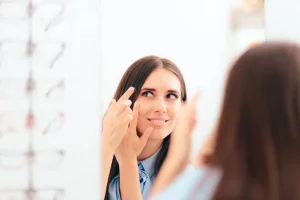“Signs You Are Unattractive: A lack of genuine smiles from strangers.”
In a world that often emphasizes beauty standards, the concept of attractiveness can be a nuanced and subjective matter.
However, there are subtle indicators that might leave you pondering the reflection in the mirror, wondering if you’ve stumbled upon the elusive signs you are unattractive.
As we navigate the intricate dance of social dynamics and self-perception, it’s essential to recognize that attractiveness transcends conventional aesthetics.
Join us on a journey beyond the surface as we explore the intricate tapestry of signs that might just be a mirror reflecting a deeper, more profound understanding of our own unique allure.

Signs You Are Unattractive
Poor Body Language and Posture
One of the telltale signs of being perceived as unattractive is often reflected in body language and posture.
Slouching, lack of eye contact, and closed-off gestures can convey a lack of confidence and self-assurance, which may be interpreted as unattractive traits.
Lack of Personal Grooming
Neglecting personal grooming habits can significantly impact how others perceive your attractiveness.
Unkempt hair, untrimmed nails, and disheveled clothing can convey a lack of care for oneself, which may be unattractive to others.
Limited Social Interactions
Social interactions play a crucial role in how we are perceived by others. If you find yourself frequently excluded from social gatherings or conversations, it could be a sign that others perceive you as unattractive or unapproachable.
Negative Self-Talk
Constantly engaging in negative self-talk or expressing low self-esteem can also signal to others that you may not see yourself in a positive light.
This negativity can be off-putting to those around you, affecting how attractive you appear to them.
Lack of Interest from Others
Perhaps one of the clearest indicators of being perceived as unattractive is a lack of romantic or social interest from others.
If you consistently find yourself overlooked or rejected in dating or social situations, it may be time to reflect on how you present yourself to the world.
Physical Signs
Lack of Grooming
Unkempt hair, poor hygiene, and neglected clothing are indicative of a lack of grooming.
Poor Posture and Body Language
Slouching, avoiding eye contact, and displaying closed-off body language like crossed arms and hunched shoulders reflect poor posture and body language.
Unhealthy Habits
Overeating or undereating, lack of exercise, and engaging in smoking or substance abuse are unhealthy habits that manifest physically.
Social Signs
Difficulty in Social Interactions
People experiencing difficulty in social interactions often find it challenging to initiate or maintain conversations.
They may feel overly self-conscious in social settings, leading to a limited social circle or a lack of close friendships.
Lack of Confidence
Individuals struggling with a lack of confidence may engage in constant self-deprecation and find it hard to accept compliments gracefully.
They may also tend to avoid social events or activities due to feelings of insecurity.
Negative Reactions from Others
Negative reactions from others can manifest as consistent overlook or ignorance, frequent rejection in social or romantic contexts, or encountering rude or dismissive behavior.
Such experiences can further exacerbate feelings of social isolation and low self-esteem.
Emotional Signs of Low Self-Esteem
Excessive Self-Criticism
Individuals may excessively criticize themselves, focusing on perceived flaws or mistakes.
They often engage in negative self-talk, undermining their own abilities and worth.
This self-criticism can be relentless, leading to a cycle of self-doubt and low confidence.
Persistent Negative Thoughts
Those with low self-esteem often dwell on their perceived flaws or shortcomings.
They may feel hopeless about improving their appearance, believing it solely determines their worth.
Persistent negative thoughts can create a sense of hopelessness and contribute to feelings of inadequacy.
Avoidance of Mirrors or Photographs
Individuals with low self-esteem may avoid mirrors or photographs due to discomfort or distress.
They consistently dodge opportunities to be photographed, fearing judgment or criticism.
Obsessive focus on perceived flaws in images or reflections further reinforces feelings of unworthiness.

Behavioral Signs
Seeking validation excessively
Constantly Seeking Compliments
Individuals may exhibit a perpetual need for validation through incessant fishing for compliments, often relying on external affirmations to affirm their self-worth.
Dependency on External Approval
Relying excessively on external validation can indicate a fragile sense of self-worth, where individuals seek approval from others to validate their own value.
Boastful Behavior as Compensation
Overcompensating with boastful behavior may signify an attempt to mask insecurities and garner external validation to fill internal voids.
Engagement in Self-Sabotaging Behaviors
Undermining Success Opportunities
Engaging in self-sabotage involves undermining opportunities for success or happiness, often driven by deep-rooted fears or insecurities.
Sabotaging Relationships
Insecurity can lead to the sabotage of relationships, as individuals may fear intimacy or believe they are unworthy of love, pushing others away.
Coping Through Self-Destructive Habits
Self-destructive habits may serve as coping mechanisms, offering temporary relief from emotional pain or stress but ultimately exacerbating underlying issues.
Resignation to Perceived Fate
Acceptance of Loneliness
Resignation to being single or alone can stem from a belief that companionship is unattainable, leading individuals to accept their fate without seeking change.
Avoidance of Self-Improvement Efforts
Efforts to improve oneself physically or emotionally may be avoided due to a belief that change is futile or unwarranted, perpetuating a cycle of stagnation.
Identity Defined by Perceived Flaws
Believing that unattractiveness defines one’s entire identity can lead to a sense of hopelessness and resignation, hindering personal growth and fulfillment.
Communication Signs
Inability to Express Oneself Effectively:
Poor Communication Skills:
Individuals may struggle to articulate their thoughts clearly, leading to misunderstandings and frustration.
Lack of Assertiveness:
A tendency to avoid expressing one’s needs or opinions assertively, resulting in being overshadowed or disregarded.
Negative Attitude:
Frequent Complaining:
Constant focus on grievances and dissatisfaction, often without seeking solutions or positive alternatives.
Focusing on the Negative Aspects of Life:
Habitual fixation on problems rather than opportunities or blessings, contributing to a pessimistic worldview.
Self-centered Behavior:
Dominating Conversations:
A tendency to steer discussions towards oneself without regard for others’ contributions or interests.
Lack of Interest in Others’ Opinions:
Disinterest or disregard for differing perspectives, leading to a one-sided interaction.
Lack of Personal Development: A Barrier to Growth
Stagnation in Personal Growth
Resistance to Learning New Things:
Individuals may find themselves resistant to acquiring new knowledge or skills, hindering their development.
Lack of Ambition:
A lack of drive or aspiration can lead to complacency, preventing individuals from reaching their full potential.
Absence of Hobbies and Interests
Limited Engagement in Activities:
People may find themselves disinterested in pursuing hobbies or activities, resulting in a monotonous routine.
Lack of Passion for Life:
Without hobbies or interests to ignite passion, life may seem dull and unfulfilling.
Remedies and Solutions
Improving Physical Appearance
Grooming Routine:
Establishing a consistent regimen to enhance personal presentation.
Healthy Lifestyle:
Adopting habits that promote physical well-being and vitality.
Enhancing Social Skills
Social Activities:
Engaging in interactions and gatherings to improve interpersonal connections.
Professional Help:
Seeking guidance from experts if facing challenges in social interactions.
Building Self-esteem and Confidence
Positive Affirmations:
Cultivating a mindset of self-worth through encouraging self-talk.
Goal Achievement:
Setting and attaining small milestones to boost confidence gradually.
Developing Effective Communication
Active Listening:
Practicing attentive and responsive listening in conversations.
Communication Workshops:
Participating in educational sessions to refine verbal and non-verbal communication skills.
Pursuing Personal Growth
Goal Identification:
Determining aspirations and objectives to work towards self-improvement.
Exploring Interests:
Engaging in new hobbies and activities to broaden personal horizons.
Environmental Signs:
Cultural or societal pressures
Society imposes various standards and norms dictating how individuals should look and behave, influencing notions of beauty and acceptability.
Influence of media portrayal of beauty
Media plays a significant role in shaping perceptions of beauty, often promoting unrealistic ideals that can lead to insecurity and self-doubt.
Peer or familial expectations
Peers and family members can exert considerable pressure on individuals to conform to certain appearance standards, impacting their self-esteem and sense of identity.
Workplace discrimination based on appearance
Discrimination in the workplace based on appearance is a harsh reality for many, affecting opportunities for career advancement and perpetuating societal beauty biases.
Lack of representation in various industries
Certain industries lack diversity and representation, perpetuating narrow beauty standards and limiting opportunities for individuals who don’t fit conventional molds.
